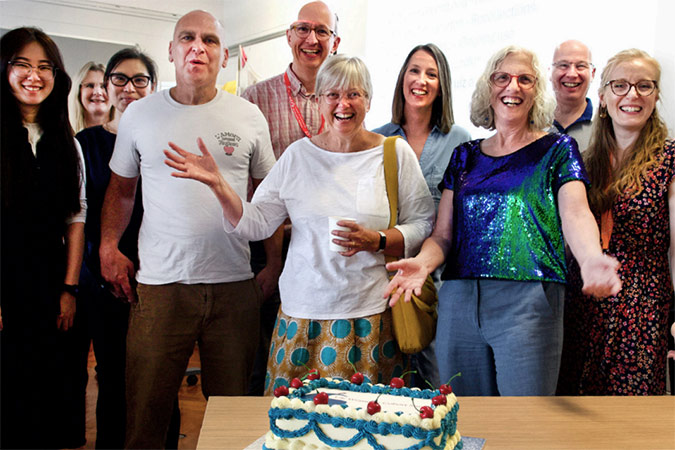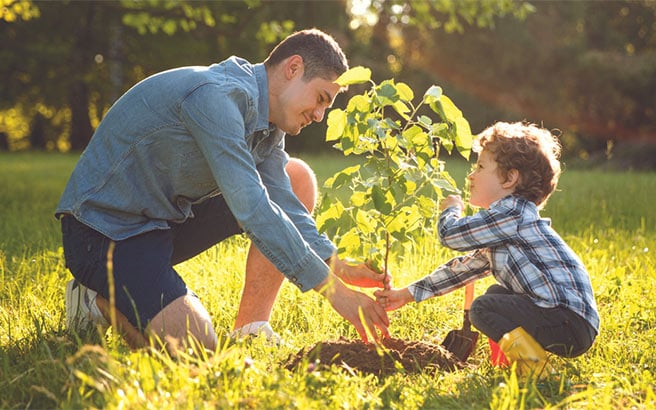How a lifetime of data provides lifelines for cancer research

The UK Women’s Cohort Study (UKWCS), which we provided initial funding for, recently celebrated its 30th anniversary! This is an incredible achievement because many research projects only last a couple of years. Such a long-term project can provide scientists with richer, more detailed information to help prevent cancer.
The UKWCS, led by Prof Janet Cade from the School of Food Science and Nutrition at the University of Leeds, is one of the largest cohort studies investigating diet and cancer in the UK, comprising over 35,000 middle-aged women and representing a wide range of different eating patterns, which can help scientists research what protects against cancer and coronary heart disease. Participants are regularly followed up to examine what effect food and nutrient intakes have on their long-term health.
Preventing cancer through what we eat
The first survey was funded by World Cancer Research Fund and the data produced from this survey and later ones has been used to investigate:
- meat and fibre intake and breast cancer
- vitamin C supplementation and breast cancer
- fibre intake in type 2 diabetes and cardiovascular disease
Over 3 decades, these investigations have provided interesting findings. For example, women who eat more fibre have a lower risk of stroke, and women who eat more red and processed meat have a greater risk of developing breast cancer.
Of course, we do not eat specific nutrients alone, so dietary patterns have also been identified and explored. Compared with meat eaters, vegetarians and fish-eaters (non meat-eaters who do eat fish) may have some protection against post-menopausal breast cancer.
This wide-ranging set of data can be used to identify common trends and to help target health information. For instance, women who eat more fruit and vegetables tend to be vegetarian or vegan, to take vitamin or mineral supplements, to be married, to be non-smokers, and to be educated to at least A-level or degree level.
To celebrate the milestone, World Cancer Research Fund hosted a party for colleagues who have worked with UKWCS over the last 30 years, in person and online from all over the country. Prof Cade talked about the UKWCS, and gave us some reminders of how different the world was 30 years ago. Diet is complex, so we need to understand how various factors interact to influence our health. It was fantastic to hear about all the findings so far from the project, and see so many people in the room who could share memories of working together.
Dr Darren Greenwood shared some reflections about the history of the UKWCS and its origins, from when we awarded the University of Leeds funding to investigate links between diet and cancers. The UKWCS grew and grew as more researchers worked with the data, and were awarded further funding. Sadly some members of the original cohort have died since the study launched. Yet Dr Greenwood reminded us that this data tells a story that helps us decode how to prevent cancer, and help people live longer, healthier lives.
This legacy is one of the enduring strengths of the UKWCS. The study has been cited in at least 9 government policy documents, providing direct life-changing information to help improve health and lives on a population scale.
Dr Diane Threapleton is one of the researchers who has used UKWCS data, including looking at how increasing fruit and vegetable intake slows weight gain. She focussed on the women of the study, highlighting how the data, time and samples they provided open a vital window into how what we eat interacts with real life. This was a timely reminder of the contributions of the women of the study, without whom none of this would have been possible.
Insights into ageing and beyond
After this, we heard from Yuanyuan Dong, who is working with the UKWCS to examine how diet affects the risk of rheumatoid arthritis. Yuanyuan joined us online from China, highlighting the global reach of the experts working with the cohort.
Finally, Dr Sarah Jing Guo told us about her plans for the UKWCS data – looking to the next 30 years! She gave us details of what her PhD student, Xinyue Liu, is examining with her project looking into how replacing processed meat with unprocessed meat or dairy products affects the risk of developing type 2 diabetes. She also gave us insights into how the cohort data could aid research into an ageing population, looking at Parkinson’s disease, Alzheimer’s or musculoskeletal disorders.
This amazing piece of long-term research is an important reminder of how small seeds of funding can have an impact over many decades and even lifetimes. We’re truly grateful to the donors of 30 years ago who helped make this research happen.
> More details about the UK Women’s Cohort Study, including information about publications

Documents from the UK Women’s Cohort Study

Help us fund the research of the future
Gifts in Wills help us fund long-term research projects like Prof Cade’s
